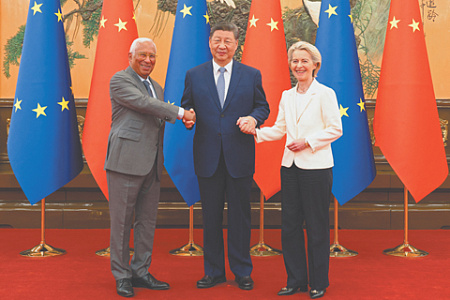
A high-stakes summit in Beijing, intended to celebrate the 50th anniversary of China-EU relations, instead highlighted the profound disagreements between the two global powers. The talks on Thursday between Chinese President Xi Jinping and top European Union officials, Commission President Ursula von der Leyen and Council President António Costa, were characterized as starkly business-like and tense, failing to bridge significant gaps on critical trade and geopolitical issues.
The European side arrived with pointed economic grievances. Von der Leyen explicitly called for a “rebalancing” of the relationship, citing the EU’s massive trade deficit with China, which soared to $360 billion last year. Her visit was preceded by sharp accusations from Brussels that China’s industrial overproduction is flooding global markets with cheap goods, directly undermining European manufacturers and creating an unsustainable economic dynamic.
President Xi, however, attempted to steer the discussion away from specific trade disputes toward broader strategic concerns. He urged the EU to make the “correct strategic choice” and to work with China to uphold the global order established after World War II. Xi emphasized that amid growing global instability, both sides should enhance communication and trust, and called for the EU to establish itself as a strategically autonomous power on the world stage, alongside China, Russia, and the United States.
Another major point of friction was Russia’s war in Ukraine. President Costa reportedly made a direct appeal to Xi, stating that China should pressure Russia to cease its military actions and respect the UN Charter. This followed accusations from the EU that Beijing is indirectly aiding Moscow’s war effort by supplying its defense industry with dual-use goods, including microchips and other critical technology.
Beijing firmly pushed back against these claims, reiterating its official position of neutrality and impartiality on the Ukraine crisis. Chinese officials promoted their joint peace initiative with Brazil as a constructive framework for a negotiated settlement, underscoring the fundamental divergence in how Beijing and Brussels view the conflict and the path to its resolution.
The summit concluded without tangible progress on these core issues, a reality reflected in the conspicuously vague final communiqué. The document omitted any mention of the contentious topics, focusing instead on shared goals like developing renewable energy and providing green technology to developing nations. This lack of substantive agreement signals a widening chasm between the two partners, with one expert noting that any past stimulus for cooperation has faded as the EU increasingly aligns its strategic interests with Washington.
